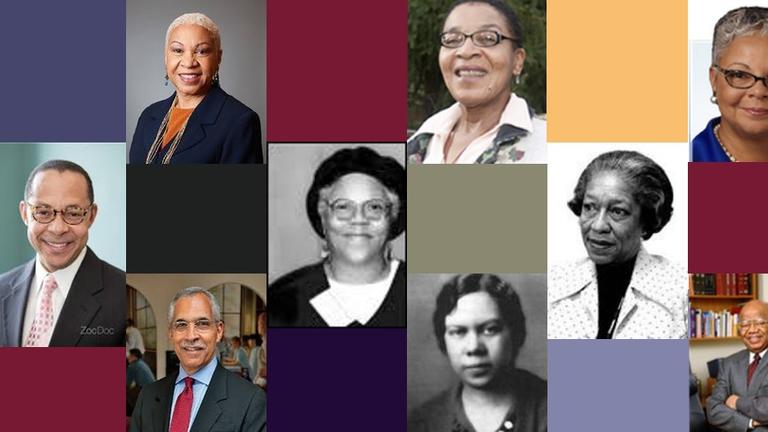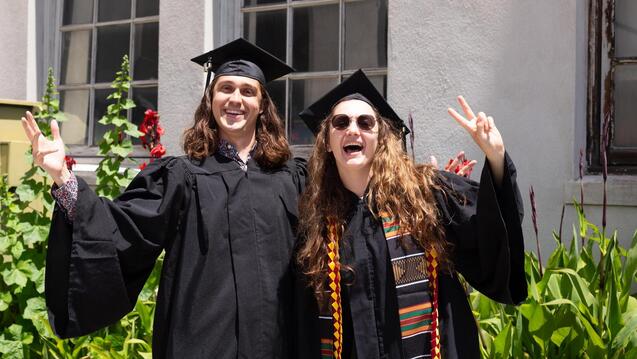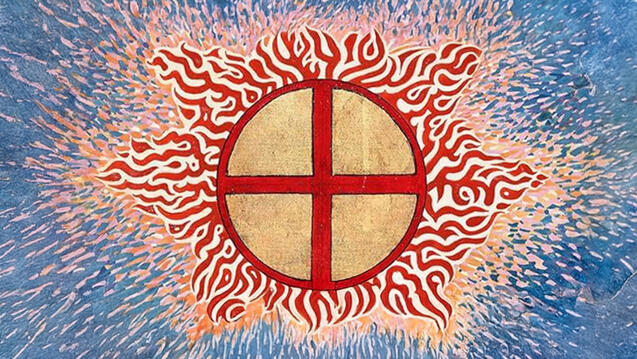CIIS will celebrate the Class of 2025 on Saturday, May 17 at 1 p.m. PDT at A.C.T.'s Toni Rembe Theater in San Francisco.

Celebrating African American Psychologists for Black History Month
Celebrating the Achievement and Contributions of African Americans to the Mental Health Field
I am Camille Spivey, a first-year Clinical Psychology doctoral student at CIIS. As a former teacher and future psychologist, I believe it is imperative to acknowledge and honor the contributions of African Americans because Black history is American history, and the contributions of African Americans in this field have changed the world.
For example, if not for the research done by Dr. Kenneth and Mamie Clark, school segregation may not have been outlawed in the famous Brown v. Board of Education Supreme Court case of 1954.
Too often throughout American history, Black voices, stories, triumphs, and achievements have been suppressed. Yet, it is critical that we honor the contributions made in the past that have shaped the field of psychology today. Therefore, in honor of Black History Month, I decided to feature contemporary psychologists and therapists, as well as key historical figures who have and are currently making history through their work.
My goal is to highlight for our University community key contributions from those who are elevating, innovating, and curating a culture of excellence in the field, from the African diaspora.
Dr. Herman George Canady (1901-1970)
Social Psychologist: Most famous for his article “The Effect of ‘Rapport’ on the I.Q.: A New Approach to the Problem of Racial Psychology,” Dr. Canady was the first psychologist to research the role of the race of the examiner as a bias factor in IQ testing.
Dr. Ruth Winifred Howard Beckham (1900-1997)
Dr. Beckham, dubbed “the feminist psychologist,” is among the first African American woman to earn a PhD in Psychology and was an active participant in the American Psychological Association, the International Council of Women Psychologists, the American Association of University Women, the National Association of College Women (an African American-based group), and the Women’s International League for Peace and Freedom (apa.org).
Dr. Mamie Phipps Clark (1917-1983)
In 1943, Dr. Clark was the first black woman to receive her PhD from Columbia University, and the second black person—her husband Kenneth having been the first. Dr. Clark’s thesis, “The Development of Consciousness of Self in Negro Pre-School Children,” was the beginning of a line of research that became historic when it was used to make racial segregation unconstitutional in American public schools. In 1946, Mamie Clark opened The Northside Center for Child Development in Harlem, NY.
Dr. Joy Harden Bradford
Dr. Joy Harden Bradford is a licensed psychologist, speaker, author, media personality, and the host of the wildly popular mental health podcast, Therapy for Black Girls. She received her bachelor’s degree in Psychology from Xavier University of Louisiana, her master’s degree in Vocational Rehabilitation Counseling from Arkansas State, and her PhD in Counseling Psychology from the University of Georgia. Her work has been featured in O, The Oprah Magazine, Forbes, Bustle, MTV, Huffington Post, Black Enterprise, Refinery29, Teen Vogue, and Essence.
Dr. Joseph L. White (1932-2017)
Dr. Joseph L. White is known as the “Father of Black Psychology,” for exposing the implicit whiteness in the field of psychology, and confronting the APA on its controversial history of defining Blacks as ignorant, deviant, and lacking in intelligence, in his famous article “Toward a Black Psychology.” White helped found the Association of Black Psychologists in 1968, and established the first Black Studies program during the 1968 strike at San Francisco State University.
Dr. Inez B. Prosser (1891-1934)
America’s FIRST black female psychologist received her doctorate in psychology from the University of Cincinnati in 1933. Her dissertation examined the academic development of African American children in mixed and segregated schools. Her findings showed that African American children fared better socially and academically in segregated schools.
Dr. Guerda Nicolas
Dr. Guerda Nicolas is a licensed psychologist whose practice specializes in children, family, and community well-being. Prior to coming to the University of Miami, she held faculty positions at Boston College as well as the College of Saint Elizabeth in New Jersey. As a multicultural (Haitian American) and multilingual psychologist (Spanish, French, and Haitian Creole), her current research projects focus on developing culturally effective mental health interventions for people of color, with a specific focus on immigrant children, adolescents, and families.
Dr. Carolyn Robertson Payton (1925-2001)
Dr. Carolyn Robertson Payton received her PhD in Psychology from Columbia University in 1962. She was the first woman and the first African American to be appointed by U.S. President Jimmy Carter, to Director of the U.S. Peace Corps in 1977. Best known for her career work at Howard University, Payton served as Director of the Howard University Counseling Service (HUCS) from 1970 to 1977. She received the Distinguished Professional Contributions to Public Service Award in 1982 and the APA’s Award for Outstanding Lifetime Contribution to Psychology in 1997.
Dr. Claud Steele
Dr. Steele is highly sought after for his work on stereotype threat and its application to minority student academic performance. In 2010, he released Whistling Vivaldi and Other Clues to How Stereotypes Affect Us, summarizing his research on stereotype threat and the underperformance of minority students in higher education.
Dr. Beverly Daniel Tatum
Dr. Beverly Daniel Tatum, a thought leader in psychology and higher education, was the 2013 recipient of the Carnegie Academic Leadership Award and recipient of the American Psychological Association Award for Outstanding Lifetime Contributions to Psychology in 2014. Former President of Spelman College, Tatum is author of the best-selling book Why Are All the Black Kids Sitting Together in the Cafeteria? And Other Conversations About Race, now in its 20th anniversary edition
Dr. Joy DeGruy
Dr. Joy DeGruy is a renowned researcher and educator. Her historic work focuses on the intersection of American chattel slavery, violence, racism, and trauma. DeGruy served as an Assistant Professor at Portland State University’s School of Social Work for over two decades, and currently serves as President and Chief Executive Officer of her own publication company. She is the author of Post Traumatic Slave Syndrome: America's Legacy of Enduring Injury and Healing.
Dr. Kenneth Clark (1914-2005)
Dr. Kenneth Clark was the first African American man to receive a doctoral degree from Columbia University. The First African-American tenured full professor at the City College of New York, Dr. Clark was also the first African American president of the American Psychological Association and the first African American appointed to the New York State Board of Regents.
Solomon Carter Fuller, MD (1872-1953)
Dr. Solomon Carter Fuller was the first African American psychiatrist. In 1903 Dr. Fuller was chosen by Alois Alzheimer to do research at the University of Munich’s Royal Psychiatric Hospital. The Black Psychiatrists of America created the Solomon Carter Fuller Program for young black aspiring psychiatrists to complete their residency in 1974. The Solomon Carter Fuller Mental Health Center in Boston is also named after Dr. Fuller.
Related News
CIIS has joined hundreds of colleges and universities across the country in signing “A Call for Constructive Engagement.”
Join CIIS to celebrate Jung’s legacy and explore his psychology’s impact on growth, healing, and cultural change in challenging times.



